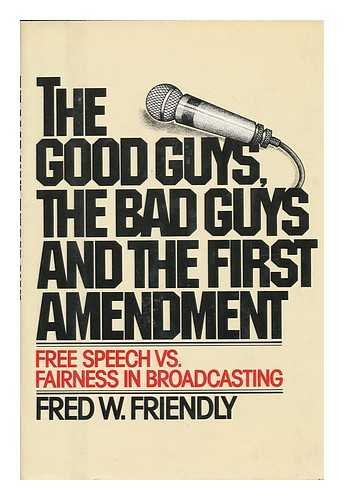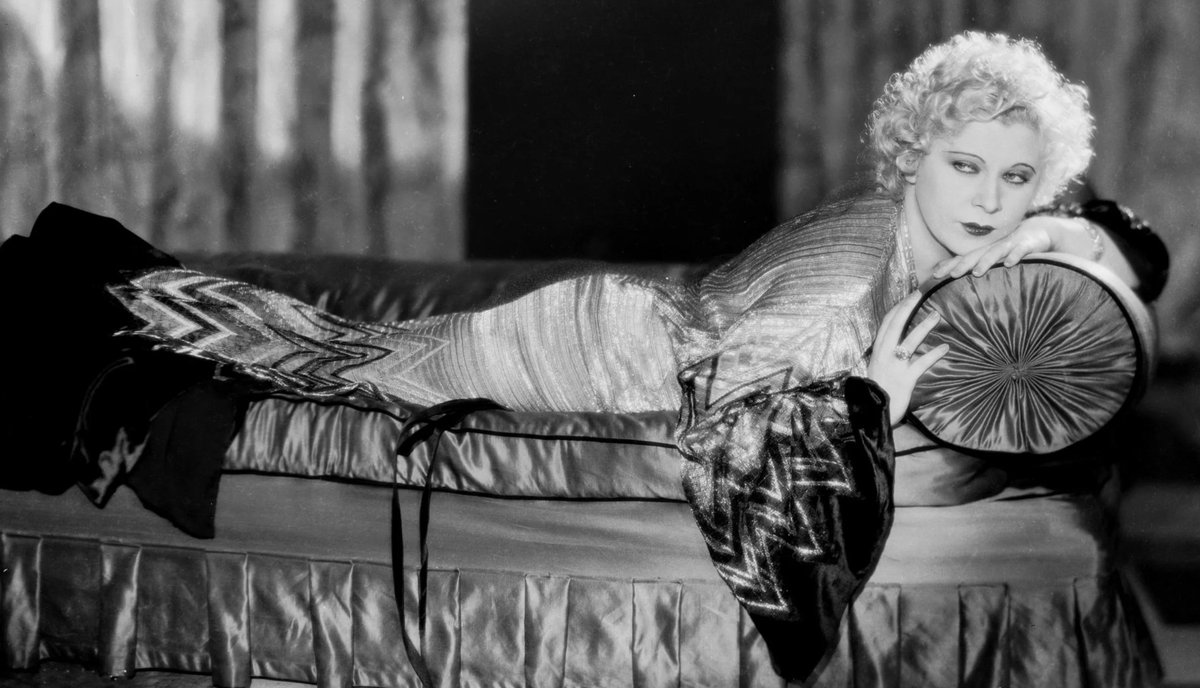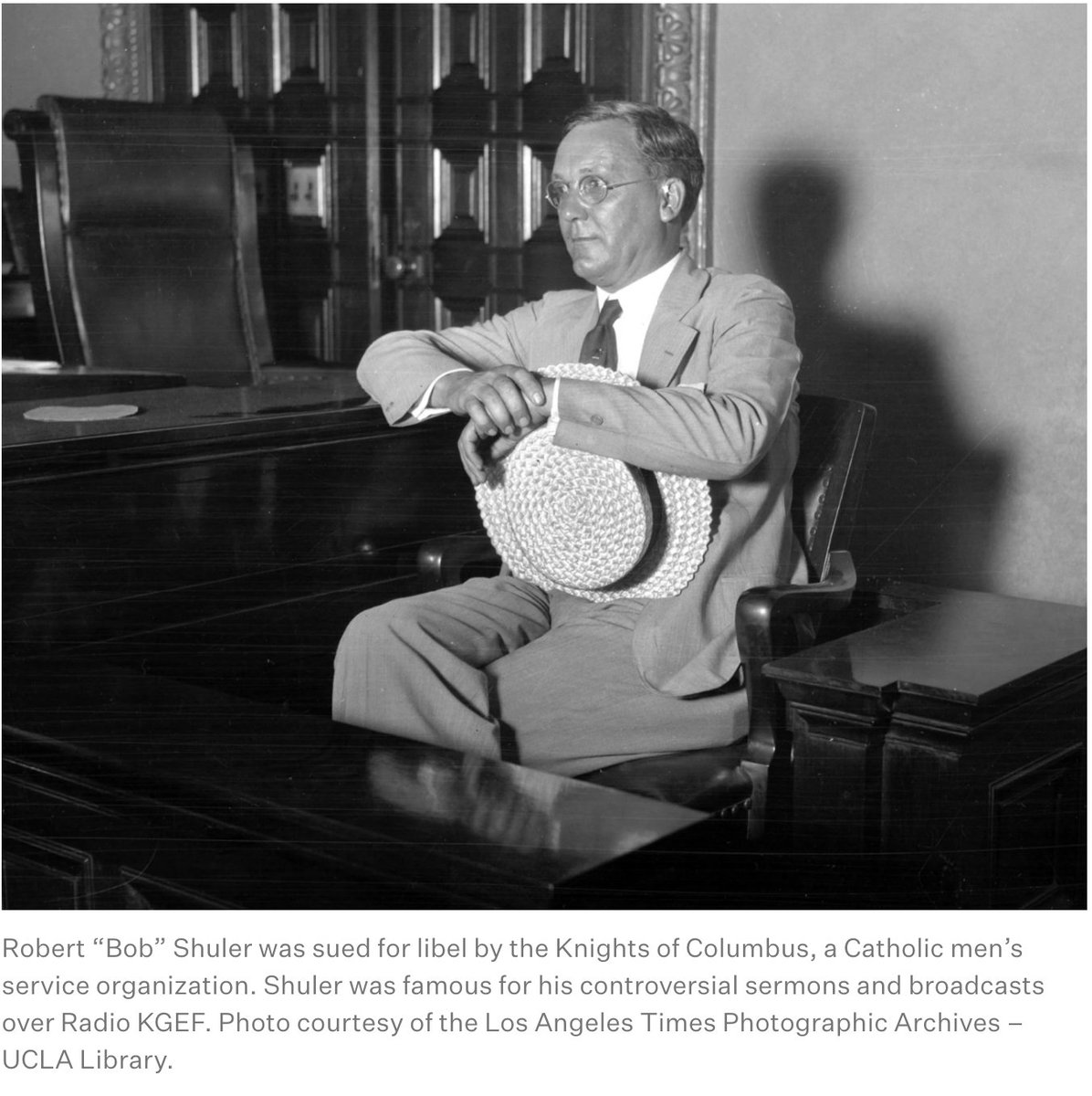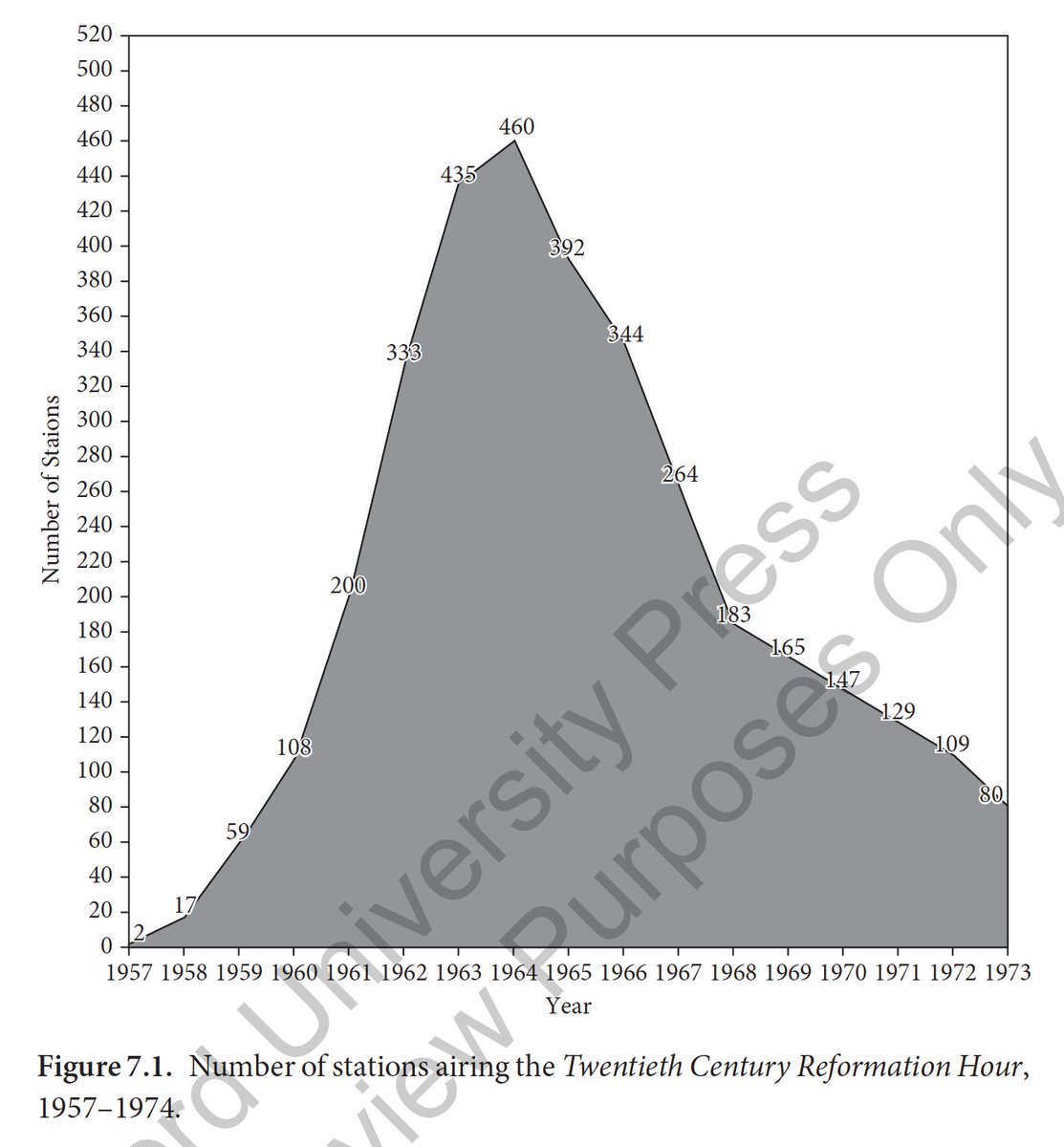I wrote a book about the Fairness Doctrine and how it was responsible for one of the worst episodes of government censorship in US history.
So I am somewhat alarmed at the calls percolating on Twitter for a new, internet Fairness Doctrine. This is a thread about why that is.
So I am somewhat alarmed at the calls percolating on Twitter for a new, internet Fairness Doctrine. This is a thread about why that is.
Let's start with what most people think when they hear "Fairness Doctrine." They imagine a time at an indeterminate point in the past when mass media was reasonable, balanced, equitable, and fair. It was a veritable golden age of mass media and the Fairness Doctrine was to thank.
Back then, radio & tv stations couldn't just air their opinions, spreading unchecked misinformation. No, they had to let the other side of any given issue have a say, giving the good guys a chance to check the bad guys when they told bald lies.
However, the problem with this narrative is that it is almost entirely a myth. In actuality, the Fairness Doctrine was a tool wielded by political interests in order to suppress dissident speech & prevent activists (from both Left & Right) from exposing the lies of the powerful.
But telling that story requires going back before the first major test of the Fairness Doctrine in 1963, before the rules were created in 1949, all the way back to the first meaningful attempt at federal regulation of radio in 1927.
The key phrase in the Radio Act of 1927 was the idea that the federal government would have discretionary licensing power over the airwaves with an eye to promoting "the public interest, convenience, and necessity."
Does that sound vague to you? Good; it did to station owners back then as well! Whose convenience are we talking about? What's necessary and what's non-essential? Is there such a thing as a singular public interest?
All very good questions and all opportunities for rent-seeking. As it turned out, the more political connections and capital one had, the more public interest merit your license application effectively had.
The government regulatory body, then the Federal Radio Commission (FRC), was a revolving door with the industry, and the big radio networks like CBS used their influence to consolidate a previously more indie radio landscape.
If you weren't the radio equivalent of the all-American quarterback, your chance of getting a license went down precipitously.
What's that, you're a socialist? Tough luck, ya commie bastard! You want a station for immigrants that doesn't air in English? Goodness, no, only true-blue Americans need apply! You're opposed to the New Deal? Shudder.
Radio broadcasting in the 1930s quickly became less weird, less diverse, more corporate, more moderate, more anodyne, and more centralized. Even actress/comedian Mae West was barred from the airwaves until 1950 after a 1937 sketch in which she uttered the shocking obscenity:
"Come on home with me, honey. I’ll let you play in my wood pile." Quelle horreur! Thank goodness the FCC was around to protect us from mild innuendo.
http://ultimatehistoryproject.com/mae-west-incident.html
http://ultimatehistoryproject.com/mae-west-incident.html
But the FRC's clampdown on indie licenses didn't go unchallenged. A muckraking fundamentalist pastor from Los Angeles, the aptly nicknamed "Fightin' Bob" Shuler, lost his license b/c of retaliation from corrupt local politicians. He sued, claiming a violation of his free speech.
The case, Trinity Methodist Church South v. Federal Radio Commission (1932), made its way to federal circuit court, which denied his license renewal and, more importantly, upheld the FRC's power to license or deny stations on the basis of the content of their speech.
All subsequent jurisprudence on broadcast speech regulation hinged on Trinity and a handful of other cases from the time. https://www.leagle.com/decision/193291262f2d8501585
There's a big contrast b/t what was happening in free speech cases in broadcasting vs print media. Just before the Trinity case (& cited by it), the US Supreme Court had ruled in Near v. Minnesota (1931) that prior restraint on newspapers was censorship. https://billofrightsinstitute.org/e-lessons/near-v-minnesota-1931
So we ended up with two very different regimes in mass media. Print speech received firmer & clearer protections from the courts. Meanwhile, broadcast speech was given second-class status. The FCC could grant/pull licenses based on whether it favored the content of their speech.
You might wonder how the FRC/FCC got away with it? Simple. They invented a reason. They came up with the "scarcity rationale," which said that since the radio spectrum was finite, the First Amendment shouldn't apply because the government *had* to choose winners/losers.
But the scarcity rationale was a legal fiction, if for no other reason than b/c the FCC has *never* hit the technical limit on the # of possible stations, either then or now. Nevertheless, that was the ex post facto justification that the courts bought until 1994.
What do you think politicians and interest groups would do if we suddenly removed most free speech protections from a mass media form today? They would game the system to punish the speech of people they dislike & reward their allies for speech that they prefer.
And that's what happened in the 1930s. For instance, President-for-Life Franklin Delano Roosevelt didn't like criticism. He believed he was saving America from the Great Depression and had little tolerance for those who criticized his New Deal plan.
The worst offenders were conservative newspaper owners who increasingly criticized him, especially after his Supreme Court-packing scheme in 1937. Now, cases like Near v. Minnesota had established that FDR couldn't go after his print critics, but...
...he COULD go after his critics in radio. And many of those newspaper magnates were buying up radio stations. So FDR "put the blowtorch" on his FCC Chairman, Larry Fly, to use FCC regulatory authority to clamp down on the president's critics.
Indeed, Fly's most lasting legacy was the Mayflower Doctrine, a precursor of the Fairness Doctrine. In Mayflower, a station that had "editorialized"--aired the opinion of the station owner--and attacked FDR lost its license to a disgruntled former employee.
Fly wrote, "A truly free radio cannot be used to advocate the causes of the licensee. It cannot be used to the support of principles he happens to regard most favorably. In brief, the broadcaster cannot be an advocate.”
It was the "No True Scotsman" fallacy enshrined in policy.
It was the "No True Scotsman" fallacy enshrined in policy.
The radio industry pushed back, which ultimately ended with the FCC in 1949 repealing the Mayflower doctrine but still asserting that licensees who editorialize are "under an obligation to insure that opposing points of view will also be presented."
This 1949 statement was the basis of the later Fairness Doctrine, which Congress indirectly validated in 1959 while trying to make sure that upstart politicians couldn't get a broadcast advantage over incumbent politicians in the election of 1960.
The FCC slipped the Fairness Doctrine in w/ this "equal time" rule, but let's focus on the Fairness Doctrine. From 1949 - 1963, the FCC had exercised a policy of salutary neglect. There was relatively little attempt to control the content of broadcasting compared to the 30s.
But something big was changing just under the surface of the radio industry. The big radio networks, which had controlled ~95% of all stations in the 1940s, turned its attention to the new television medium.
Most new radio licenses started going to small-timers, like a car dealer who wanted a station to promote their business. Money was tight for these indie stations, so they were open to selling timeslots to previously marginalized and radical groups.
That included a new generation of right-wing radio broadcasters who (unfairly) attacked liberals and Democrats as communist sympathizers. By 1961, President JFK was a particular target, whether for his mishandling of the Bay of Pigs or his proposed Nuclear Test Ban Treaty.
And this new "Radio Right," as I call it, went from nothing to something in just a few years. For example, the top of these broadcasters, the fundamentalist minister from New Jersey Carl McIntire, had gone from airing on 2 stations in 1956 to over 468 by 1964.
To give you a sense of the scale, McIntire's estimated weekly audience was 20 MILLION (which, for sake of comparison, is as many as Rush Limbaugh at his peak some forty years later.)
JFK, who had narrowly won in 1960, wanted these Radio Right guys quashed. His brother & Attorney General Robert Kennedy (also the reason for anti-nepotism rules that held until Trump & "the Kush") concocted a plan with the help of labor union allies Walter & Victor Reuther.
Their plan, nicknamed the "Reuther Memorandum," was, first, to use IRS audits to dry up the flow of listener donations to right-wing broadcasters; then they would use FCC Fairness Doctrine complaints to put pressure on the stations that sold these broadcasters airtime.
You'll have to read my book for more about the IRS's "Ideological Organizations Project," but the Fairness Doctrine component was also highly successful. JFK told his newly appointed FCC Chairman Bill Henry in the summer of 1963, "It is important that stations be kept fair.”
Henry promptly issued a "clarification" of the FD rules that singled out examples of conservative speech needing balancing by liberal voices. If a station didn't balance, well, someone could file a Fairness Doctrine complaint that would be considered at license renewal time.
Losing a license was the death penalty for stations. Your expensive transmitter & tower were worthless without it. But even if you didn't lose your license, you might have to bear the expense of hiring legal counsel to fight the complaints, extra staff to show FD compliance, etc.
Henry also formulated something called the Cullman Doctrine, which stipulated that response time to personal attacks--like, say, a criticism of an administration official--should be provided for free if the victim of the attack said they couldn't afford to pay.
(They could never afford to pay.) This made allowing direct criticism of public figures an expensive proposition for station owners, who responded by ditching conservative broadcasters known for making attacks. Apolitical and mainstream content was less fuss, less muss.
Here's an example of how the JFK administration used the FD to mute critics. JFK wanted a Nuclear Test Ban Treaty w/ the USSR as the centerpiece of his reelection bid. (He didn't yet know that he'd soon lose a meaningful portion of his skull in Dallas.) The Radio Right hated it.
The White House organized a secret front organization, the Citizens Committee for a Nuclear Test Ban, to threaten stations that aired critiques w/ FD complaints unless they were given free response time. The plan was a success & 100s of hours of free pro-treaty time was secured.
To give just one more example, the Democratic National Committee also secretly organized a pressure campaign in 1964 to get free airtime for the LBJ campaign. Eg, they demanded response time after a host accused LBJ of using the Gulf of Tonkin incident as a pretext for war.
Johnson had done precisely that, of course--infamously saying behind closed doors that he didn't care if the radar ghosts were whales--but the truth in this instance was damaging and the lie politically useful.
Some stations attempted to fight back. One case went to the US Supreme Court, Red Lion Broadcasting v. FCC. The court, citing the Trinity precedent, upheld the FD, making a tortured comparison to acceptable limits placed on trucks carrying loudspeakers.
https://www.oyez.org/cases/1968/2
https://www.oyez.org/cases/1968/2
But the justices had been snookered. They were totally unaware of the facts of the case, of the carefully laid plan for censorship created by the Kennedy administration and carried forward by the DNC. Indeed, the DNC had secretly backed and funded the complainant.
They paid for his health insurance, notified him of Red Lion's personal attack, and so on.
So the court had pooh-poohed allegations of censorship while validating the most successful episode of government censorship of the last half century.
So the court had pooh-poohed allegations of censorship while validating the most successful episode of government censorship of the last half century.
In any case, the censorship campaign was a wild success. Radio stations started dropping right-wing broadcasters in numbers, as you can see from this chart of Carl McIntire's total station count. By the 1970s, the Radio Right was a shadow of its former self.
To step back from the story for a moment, let me note that techno-progressives often have a misplaced nostalgia for the Fairness Doctrine, a belief that leads them to gloss over these sordid examples. Does any of this sound "imperfect but legitimate"? https://twitter.com/VWPickard/status/1349065201732251649?s=20
The end of the Fairness Doctrine era began in the late-70s w/ the laissez-faire commissioners appointed by Jimmy Carter (the true Great Deregulator). Reagan's FCC ended the rule in '87. Congressional Democrats tried to reinstate the rule, but Reagan vetoed and that was that.
So what does that history have to do with today? The Fairness Doctrine's been gone for ~ four decades. Besides, it wouldn't apply to cable or the internet since there is no scarcity rationale for either. So why are people suddenly talking about the Fairness Doctrine again?
First, note how lucky we are that the courts/Congress decided to regulate the internet under a print regime rather than a broadcast regime. As a result, the internet was "born free," to borrow an @AdamThierer phrase, with all the speech protections that had accrued for print.
For example, with the (in)famous Section 230, Congress formally codified for the internet a set of legal precedents that had sprung up to protect bookstores from publisher liability, as @bskorup and @jrhuddles have detailed.
https://papers.ssrn.com/sol3/papers.cfm?abstract_id=3501713
https://papers.ssrn.com/sol3/papers.cfm?abstract_id=3501713
Thank goodness! Imagine how disastrous a Fairness Doctrine for the internet would have been, if outlets & platforms had an affirmative obligation to ensure that articles published or user posts permitted were carefully balanced according to an ambiguous public interest standard.
Think of the mischief that, say, the Trump administration could have gotten up to with the president leaning on his FCC appointees to fine the Washington Post for posting articles that almost exclusively made his administration look bad.
Or if when Trump threatened (ludicrously) to revoke NBC's license in 2017 for criticizing his nuclear weapons policy, there had been some Fairness Doctrine style regulations for him to leverage. https://www.sandiegouniontribune.com/opinion/the-conversation/sd-could-trump-revoke-nbc-license-after-nuclear-arsenal-report-20171011-htmlstory.html
This is the shoe-on-the-other-foot test through which all proposed regulations ought to be filtered. Don't just think about the good that *you and yours* can do with it; imagine the bad that the other guys could get up to. If that makes you shudder, well, you're not alone.
Indeed, the political operatives who ran the JFK/DNC Fairness Doctrine censorship campaign had second thoughts when Nixon came to power and used the implicit threat of the Fairness Doctrine and other FCC regulations to cow tv networks into giving him more favorable treatment.
Now, the lawyers among you are likely thinking that none of this matters because the Fairness Doctrine can't apply to cable or the internet because the scarcity rationale doesn't exist for them. That's true but unimaginative.
Indeed, the scarcity rationale--truly a legal fiction among legal fictions--is itself a reminder of how it's always possible to find a rationalization if you look hard enough.
As @johnsamplesCato and I wrote for @knightcolumbia, where there's a will, there's a way. That's because the Trinity, Red Lion, etc precedents are all still active and could be applied to the internet...if someone can find or invent a new legal fiction. https://knightcolumbia.org/content/social-media-regulation-in-the-public-interest-some-lessons-from-history
If, to give one example, the internet were classifed as a public utility or resource, it might be possible to port public interest standards from broadcasting over as well, as @pmnapoli has proposed. http://cup.columbia.edu/book/social-media-and-the-public-interest/9780231184540
So, yes, the Fairness Doctrine as originally conceived wouldn't get through a First Amendment challenge in court if applied to an internet platform. But there are very smart, very motivated people working on the "as originally conceived" part of that.
There are also lots of very dumb proposals being made for Fairness Doctrine-style regulation of online platforms, like Josh Hawley's proposal--back in the days before he abetted an insurrection--to have the FTC certify social media platforms for political neutrality.
But even if one of these proposals were enacted and then were ultimately overturned by the courts, that could mean *years* of messy legal challenges with significant chilling effects on online speech and innovation. And that's the best case scenario.
If you think a new Fairness Doctrine can be narrowly applied *only* to bad speech or lies, then the history of the actual Fairness Doctrine is no comfort. No matter how good the authorial intentions, it quickly became a tool for punishing speech of all kinds & protecting lies.
I'll sign off now, but if you want to read more about the Fairness Doctrine, the censorship campaign and lots of other odd, fascinating stuff (Polish ham boycotts! Converted WW2 minesweepers!) then check out my book. https://www.amazon.com/Radio-Right-Broadcasters-Government-Conservative/dp/0190073225
If you prefer podcasts, I chatted with @jonahdispatch for @JonahRemnant about the book. https://remnant.thedispatch.com/p/the-spirit-of-radio-18f
Oh, and your wish, @popehat, is my command! https://twitter.com/Popehat/status/1352650988155359232?s=20

 Read on Twitter
Read on Twitter






